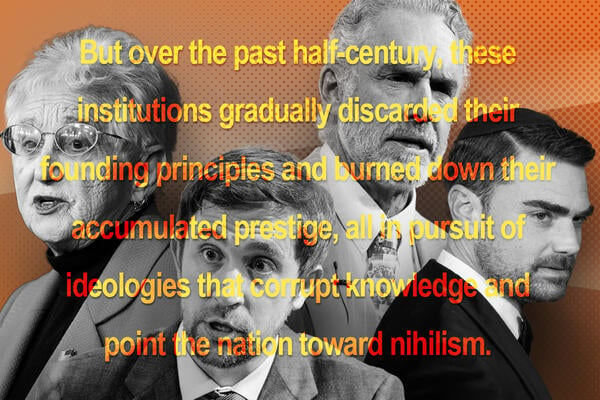
Pay Attention to “The Manhattan Statement” (opinion)
Earlier this month, the Manhattan Institute released a statement with a proposed “new contract” for higher education and called on President Trump to write the terms of that contract into “every grant, payment, loan, eligibility, and accreditation” and then revoke federal funding for colleges and universities if they aren’t following them. To maintain public funding, universities would, for example, have to “advance truth over ideology,” “cease their direct participation in social and political activism,” and “adhere to the principle of colorblind equality, by abolishing DEI bureaucracies, disbanding racially segregated programs, and terminating race-based discrimination in admissions, hiring, promotions, and contracting.”
Another term of the proposed contract would require universities to enact “swift and significant penalties, including suspension and expulsion, for anyone who would disrupt speakers, vandalize property, occupy buildings, call for violence, or interrupt the operations of the university.”
You may be thinking: Well, think tanks and political actors publish things like this all the time. What’s the big deal?
This proposed list of reforms was led by the Manhattan Institute’s Christopher Rufo, who has been the architect of many of the attacks on higher ed that we have seen come out of the White House and the Department of Education over the last six months.
But what is more concerning is it was signed by Congresswoman Virginia Foxx—former chair of the House Education and Workforce Committee who oversaw the first subpoena sent to a higher education institution under the pretext of fighting antisemitism on campus. It was also endorsed by Education Secretary Linda McMahon, who posted on X to congratulate the Manhattan Institute for “envisioning a compelling roadmap to restore integrity and rigor to the American academy!”
All this brings to mind Project 2025—an initiative led by another conservative think tank, the Heritage Foundation, which Democrats warned the American people about before the election and that has since been largely followed as a policy agenda for the Trump administration. You may remember that the education chapter of this conservative platform was written by the director of Heritage’s Center for Education Policy, Lindsey Burke—the same person now serving as the deputy chief of staff for policy and programs at the U.S. Department of Education.
As predicted, the policy proposals in Project 2025 mirror those being pursued by the current leadership at the Department of Education. Providing universities more flexibility on accreditation; rescinding the Biden administration’s Title IX regulations; eliminating the disparate impact standard in civil rights cases; phasing out existing income-driven repayment plans; eliminating GEAR UP; transferring programs from the Office of Career, Technical and Adult Education to the Department of Labor; and capping indirect cost rates for federal science grants are just a few of the policies in Project 2025 that have started to come to fruition in the Trump administration.
We now have another road map that college leadership and policymakers need to be ready to push back on. As noted above, the Manhattan Institute’s agenda is comprised of pledges for colleges and universities that include ending participation in social and political activism; abolishing diversity, equity and inclusion programs; ending race-based decisions in hiring, promotions and contracting; and enacting restrictions on free speech. In other words, it is a road map for a new level of federal interference into the administration of colleges and universities. It is not a road map for reforms that will help students. Rather, it is an attempt to undermine the independence of our higher ed institutions by dictating policies—those based on a specific political ideology—in exchange for federal funding.
What’s next? Just like the proposals in Project 2025, Christopher Rufo’s proposals have had a pretty good track record of being implemented by the Trump administration. If the past is prologue, we can expect to see new language in program participation agreements that ties Title IV funds to restrictions on academic freedom; new accreditation rules that prohibit standards around diversity, equity and inclusion; and certifications sneaked into grant terms and conditions that threaten strict penalties for activities that do not align with this administration’s ideology.
Higher education institutions have been far from perfect, and some may even have drifted from their missions of serving all students in the best way possible. But what students deserve is a reform agenda that leads to student success, college completion and strong postsecondary outcomes. That is the agenda that should be endorsed by our nation’s leading education official. What the Manhattan Institute is proposing is not an agenda that is in our country’s best interest.
We need an agenda that makes access to a college degree or credential of value affordable and accessible. We need an agenda that allows a range of viewpoints to thrive across college campuses and fosters intellectual diversity. We need an agenda that ensures college campuses are inclusive communities and that they serve all students, and we should have a contract between the federal government and colleges and universities that protects investments in our nation’s future and success—not one that threatens disinvestment and opens the door for political interference and federal intrusion.
Source link



